Artifacts Read online
Table of Contents
ARTIFACT
THE WAY SHE SMILES, THE THINGS SHE SAYS
TANGLED UP
MIND VAMPIRES
NEIGHBOURHOOD WATCH
SCATTER MY ASHES
BEYOND THE WHISTLE TEST
THE EXTRA
THE VAT
IN NUMBERS
THE DEMON’S PASSAGE
FIDELITY
BEFORE
DUST
WORTHLESS
REIFICATION HIGHWAY
WANG’S CARPETS
TAP
YEYUKA
ONLY CONNECT
ARTIFACT
Euclid screams because the hooded man bends his arm behind his back. I wish it would stop, because I fear the sound of snapping bone. Euclid has very thin arms.
Before waking, perhaps precipitating it, I ponder the insultingly obvious roots of the dream. Euclid’s thin arms are the laser beams that criss-cross the artifact, bent by the black hole at the centre, which is hooded by its event horizon. Euclid screams because space around the black hole is violently distorted and will not support his axioms of geometry.
A final image before I open my eyes is of a mass spectrometer, fed with my freshly ionised dream, depositing its easily recognised components onto a photographic plate. I label each dark spot by hand, except the last, which I know should be labelled ‘snapping bones’. The lab demonstrator would laugh if I wrote this on the plate.
Nervousness from my student days. A transparent image of my dream’s transparency. I wake.
Cabin lights brighten slowly to half strength. Over at my desk the monitor still displays a blue schematic picture of the artifact, a sixty-four-pointed star, each point joined to every other point by a slender blue beam. It is not symmetric in any plane, yet it is pleasing to look at; hypnotically pleasing.
I dress and eat. I skim through the eight-year-old news summary that arrived from home while I slept. News will come so fast on the trip back that I’ll have time for nothing else.
In the corridor, everyone knows me with embarrassed cheerfulness. People ask me to check that their shares are doing OK, although there is no way I could get word to them faster than the daily reports. Just something to say, to make me feel vaguely useful.
Eric Jackson, an astronomer like me, comes around a corner and runs towards me, breathless and seemingly hoping to talk to me.
‘You’ve got to stay. You won’t believe what I’ve found out. The ratios between the times for the beams between the nodes are all dimensionless constants!’
He peers eagerly into my face, waiting. I haven’t really heard him. His breathless staring makes me think back over his words for a reply to make him go away, and as their meaning accumulates I feel horribly uneasy. In my contract, in every contract, is a guarantee of a free passage home, no questions asked, on the next monthly shuttle. The psychiatrists say it makes us all feel less worried by the time and distance which separate us from home. I asked to go home, and they asked no questions, but eyed me with concern and disappointment. How could I tell anyone that my dreams had gone wrong?
‘Fine structure?’ I ask blandly.
‘Oh yes, and all the others.’
‘Accurately?’
‘As far as we can measure. Aren’t you thrilled?’
‘Well I suppose we know its purpose now.’
‘I’d hardly say that. I mean there are still dozens of possible explanations. It could be a work of art or a temple or a sort of “we are intelligent” thing, like on Pioneer.’
My mind drifts for a second. ‘Who cares?’ I want to say. An argument about Egyptian pyramids, and all the contrived and ultimately meaningless ratios of their dimensions, half forms and then dies. It is not likely to be coincidence or contrivance in this case, because whoever made the artifact would certainly be aware of the values of certain dimensionless combinations of physical constants. No surprise, no special implications.
‘You’ll stay now, won’t you?’
Jackson must be excited to breach etiquette so badly.
‘No.’
‘But think of all the work there’ll be.’
‘I’m sure it won’t be too much for you.’
This unsubtle hint to the unspeakable subject of nervous breakdowns, which everyone on the ship now connects with me, cuts through his excitement.
‘Look, I’m sorry, but I thought you’d be pleased. I thought it would be something to stay for.’
Two days ago, when we picked up the artifact on deep-space radar, Jackson had broken this news to me with a look in his eyes which had said what he now put into words.
We parted. Today was my last day, but I took all the usual turns, swung through all the same doors, and now I’m seated at my ‘office’ desk watching the computer doing X-ray spectrometry on emissions from gas being drawn into the black hole. My eyes will not focus on the multicoloured graphs that form in front of them, soon to be interpreted and summarised without my intervention. A small bell will sound discreetly if something remarkable is found, until I acknowledge my approval of a job well done.
The entire process, from the acceleration of the gas molecules through to the sounding of the small bell, will appear in my mind as a closed, complete entity, isolated and unchanged and unchangeable.
I hear a knock and turn around. Arthur Lindstrom, the Chief Astronomer, is walking in, saying, ‘Mind if I come in? I’d like to have a chat about Eric’s discovery.’
He sits on a swivelling chair beside me.
‘You know, we mustn’t jump to conclusions. There’s no reason to assume that this ratio business is the whole purpose of the artifact, because it could quite easily just be a minor aspect of its function. If you’ve been thinking over any theories you mustn’t junk them now just because this has come up. Nothing even in natural astronomy is ever quite as simple as it seems at first glance, and here we’re dealing with something carefully constructed by another culture. We mustn’t be satisfied with our first theories or even our tenth. This thing is going to provide generations of study, and we still may never know its ultimate purpose.’
‘Mmm.’ It was all I could say.
‘I was hoping that you might let me know any thoughts you’ve had, seeing as this is your last day on the project.’
I feel vaguely panicked. The past week I have been in no state to think intelligently about anything, accepting my lack of interest in the artifact as a final confirmation that spaceflight has disturbed me too deeply to be tolerated. Back on Earth, just reading of the discovery would have had my mind spilling over with possibilities, and being on the very ship that found the artifact an ecstatic, impossible dream.
‘Well, Arthur, to be honest I haven’t really had much time to think about it. My mind has been on other things.’
This last sentence is a little too much for him, and his mouth drops open in incredulity. What other things can there be to anyone with this greatest discovery only light-minutes away? Finally the seriousness of my impending trip home drifts into his mind, and he stands, saying as he walks out:
‘Do let me know if you have any suggestions.’
I feel like a dying man at a party, spoiling the fun for everybody else. I hope they will forget me quickly when I’ve left. It is not my intention for anyone else to feel as I do.
I instruct the computer to carry on with its spectrometry in private, and to display the blue schematic of the artifact. I rotate the plane of perspective aimlessly. The shape of the artifact is blandly soothing, drawing the eye in, then abandoning it to wander without excitement from node to node, with nothing to discover either jarring or beautiful. I try dutifully to form an hypothesis for Lindstrom’s sake, so that I shall not leave a painful scar of disappointment.
The artifact
consists of sixty-four small satellites orbiting a black hole, ingeniously arranged so that their relative positions remain unchanged. Ultraviolet lasers in each satellite are aimed at all the other satellites. As yet we are too far away to examine the satellites in detail. Some of the laser light is scattered by dust and gas which permeates the system, and we do not believe the lasers are being modulated at all. No modulation puts a wet blanket on any theories that the artifact is a computing device or an interstellar communications relay; and, so far as we can tell, no modulated signal is arriving at or leaving the artifact. There are as yet no signs that the satellites are inhabited, but it is rather too early to tell.
Why was it made? The satellites are positioned in the highly ‘curved’ space around the black hole so that the ratios between the times for the various laser beams to travel from source to destination equal dimensionless physical constants. What conceivable function could result in a design with this property, either as a necessary consequence of the function or as a ‘decoration’ possible because the function is independent of the satellite positions?
I don’t know. I don’t care. My mind wanders back to its painful obsession, the withering of my dreams, source of my imagination and happiness. My dreams on Earth were vast and complex and indecipherable, tantalising and exotic and rich beyond the comprehension of my waking self. I would touch ground each morning with my mind babbling joyously at thoughts strange beyond words or visions, and like the sun or the sea, abundant beyond any possible need, my dreams powered and flooded my waking life. They set me no challenges or problems themselves, but rather fuelled my assaults on the challenges of the daytime, inexhaustible wells of wonder overflowing into every part of my mind, every part of my life.
The first few weeks in space, the strangeness of the ship and the greater strangeness of its voyage doubled the strangeness of my dreams, and I would wake early, exhausted but not distressed by the intensity of the experience. A week ago I dreamt of an empty room.
I floated in the centre of an empty grey room, with a simple thought: this is all there is, this is all there is, this is all there is.
That was the dream. The dream announced its own simplicity, no more. The dream announced its own emptiness, no more. The dream said less than nothing because the nothing that it said was its saying nothing.
The feeling that followed was of having finished. Before, my dreams had been too huge to hold in my mind all at once, and too detailed and strangely structured to feel that they might ever end up summarised and tabulated and packed away tidily. Before, my dreams had burst through my mind, slipped through my fingers, not from evanescence but from bulk. Now, my dreams were thin skeletons laid out before me, every detail unambiguous and final, nothing to guess, nothing to explore. Nothing, nothing, nothing.
The ship’s psychiatrist, whom I have met only once and whose name I do not remember, knocks and walks in.
‘Hi.’
Yes, up yours also.
‘Hi.’
‘I just wanted to ask you if you’d given any thought to my suggestion.’
‘I’m sorry.’ He had asked me to record voluntarily an explanation of my sudden need to get home again, to be played back only after I had left the ship, and to be used only in the strictest confidence. I couldn’t bear to try to put my emptiness into words, couldn’t imagine it meaning a thing to anyone else.
‘Well, you can always change your mind. We have no wish to invade your privacy, or make you feel you have to account for your decision, but we would like to know if there are any changes we can make so that, in the future, whatever caused problems for you will not cause problems for others. We do think that’s a worthwhile goal, but of course, as it says in your contract, we can’t demand anything.’
‘No.’
No to what? No to it all. I’m very, very tired. I have a sudden weary vision of the Captain coming to ‘chat’ with me, stressing the value in my giving some hint for the planning of future missions. It’s not the considerable fuel expense of my trip that worries them, or even the effect on morale of one member of the team’s giving in. The real concern is not knowing why. Any named weakness could be grappled with; every other person could say to himself ‘I should never be worried by that’ and the matter would be under control.
The large, pale blue eyes of the psychiatrist try to ooze protective reassurance. I couldn’t even whisper ‘My dreams are all wrong’ with those terribly forgiving eyes turned at me. I have no strength now to speak of my loss of strength.
The day passes; the Captain does not come, because it would be too much of an honour. The shuttle leaves at 2300 hours, so I am lying in my cabin glancing frequently at my watch, although the computer will call me at 2230 and the Shuttle Control Officer would page me if I were not in his office at 2250.
I glance at the blue display of the artifact. I will get news reports from the ship, too, on my way home, and most of them will concern the artifact. Small unmanned probes will enter the system, explore the satellites; some will be dropped into the black hole.
Eight light-years from home, a black hole. Who would have guessed? Every astronomer’s dream come true, but I don’t feel a thing, don’t feel like an astronomer, don’t care about confirmation of the latest variation on General Relativity. I feel naked and hollow.
I have the computer play some of the music in my personal library, mainly fantasy rock of the early ’90s, but it bores me, slightly annoys me. I shut it off.
I watch the seconds digits for a while, then switch to GMT. The rate is not detectably different, as we’re going quite slowly now relative to Earth. I amuse myself a little by flicking through the various time zones. I remind myself to change the receiving frequency on my watch from that of the ship’s computer to that of the shuttle’s computer, once I am on board.
A bell rings in my watch, and at the desk monitor. I acknowledge the event, then sit on my bed for a while, not wanting to be early at the Shuttle Control Office with nothing to do. There is nothing to pack, it has all been done for me.
Now I am alone in the shuttle. The ship carries hundreds of shuttles, but only ten can be fitted out to support life on the voyage home. If more than ten people demanded to go home, they would have to take the whole ship back.
That would make the Captain very sad.
With me in the shuttle are many high-density magnetic bubble memories containing an entire month’s transmissions from the ship. They are sent back home in case something goes astray with some part of the maser broadcasts. We do not get shuttles from home, because we have much more to tell them than they have to tell us.
‘You OK now?’ asks the Shuttle Control Officer nervously. He has never sent back a person before. ‘Yes, I’m fine thank you.’
‘Well, this is it. Bon voyage.’
No party of friends to see me off. This launch is being treated like any other. I am to vanish cleanly from the minds on board.
With very little fuss, my temporary weightlessness is gone. This shuttle will be slower than the others, with only 2 gees, the ship’s standard acceleration, rather than the 15 gees of the unmanned ones. I shall not get lonely, with all the news from Earth to catch up with, and all the news from the ship to ignore. I switch on a monitor, and see the huge cylindrical shell dwindling. The artifact is not visible, of course. I switch off the monitor, and try to get some sleep.
For hours I can’t really keep my eyes closed. It does not take long to explore with my eyes the inside of the shuttle many times. Then I close my eyes and still see the rows and columns of bubble memories in neatly labelled boxes. I start counting the bits of information in there with me. Each memory contains two-to-the-thirtieth bits. 1 G, they call it. There are two thousand nine hundred memories, more than two-to-the-eleventh, so that makes more than two-to-the-forty-first bits. What a lot of garbage, I think lazily. What a vast amount. Nearly a million bits a second back to Earth.
Now I must be asleep, for the bubble memories are multiplying, the
stacks are spreading to fill the whole universe. And now they are collapsing; the walls between the neat packages are melting, until only sixty-four compartments remain. Each compartment shrinks to a point, and thin blue lines appear in the familiar configuration. The universe shrinks to the artifact, its essential summary, or maybe even, I think lazily, its essential cause. The symmetry between the two is so nearly perfect that I cannot decide which it is: ambiguity at last.
I wake with a smile. I’ll be home soon.
THE WAY SHE SMILES, THE THINGS SHE SAYS
Danny got home from the brothel just before midnight. He usually stayed all night, but the whore had thrown him out.
‘Why? What did I do?’
‘You were saying things in your sleep. I don’t have to put up with that.’
‘What kind of things?’
‘The kind of things I don’t have to listen to.’
‘What? Dirty things?’
‘Strange things.’
‘Frightening things?’
‘No. The kind of things that give me a headache. The kind of things that give me a pain in the arse.’
‘Tell me one of them.’
‘I can’t remember. Go on, get out.’
‘You must remember some of it.’
‘Hey, Daisy! This guy’s making trouble!’
‘I’m going.’ Daisy was three metres tall, with arms as broad as Danny’s chest. It was rumoured that she collected the menstrual blood of all the whores, and drank it mixed with vodka, but Danny knew that none of the whores menstruated.
The front rooms were in darkness, but the kitchen light was on. Danny called out, ‘I’m home early’ as he walked towards the kitchen, thinking that it was like walking down a dark tunnel, perhaps like being born. He felt déjà vu, he felt slightly stoned.
‘Hi Dad.’
His son Tom stood by the stove, heating milk in a saucepan, naked. ‘I’m making Milo. Do you want some?’
‘No thanks.’
What was wrong? Something had to be wrong. People aren’t naked in kitchens, they’re naked in bedrooms and bathrooms. Never kitchens. Something had to be wrong. Danny’s hands hanging by his sides suddenly seemed awkward, unnatural. He folded his arms. That seemed wrong, too, so he put them out horizontally, stretched, then placed his hands behind his neck and rubbed it, yawning.

 Zendegi
Zendegi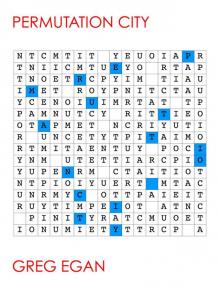 Permutation City
Permutation City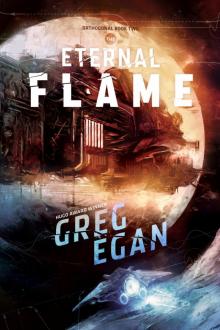 The Eternal Flame
The Eternal Flame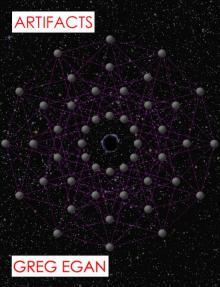 Artifacts
Artifacts Wang's Carpets
Wang's Carpets Dichronauts
Dichronauts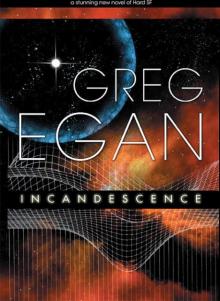 Incandescence
Incandescence Teranesia
Teranesia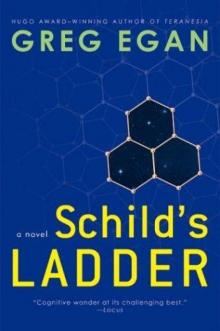 Schild's Ladder
Schild's Ladder Quarantine
Quarantine The Four Thousand, the Eight Hundred
The Four Thousand, the Eight Hundred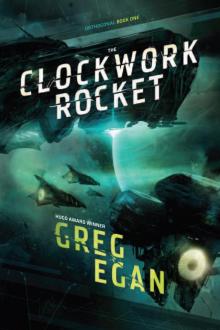 The Clockwork Rocket
The Clockwork Rocket Zeitgeber
Zeitgeber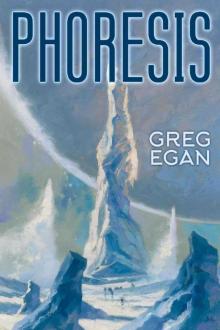 Phoresis
Phoresis The Nearest
The Nearest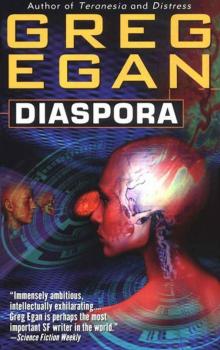 Diaspora
Diaspora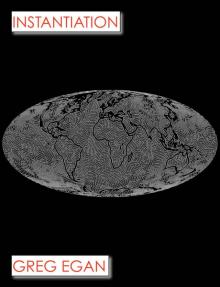 Instantiation
Instantiation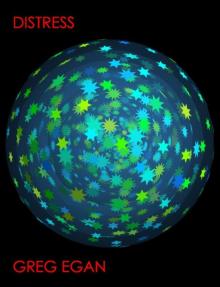 Distress
Distress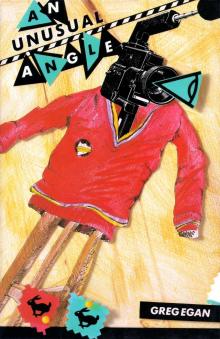 An Unusual Angle
An Unusual Angle Oceanic
Oceanic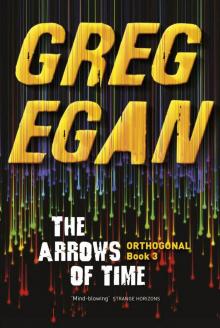 The Arrows of Time
The Arrows of Time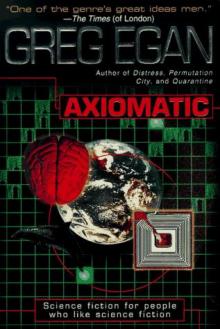 Axiomatic
Axiomatic![Anthology 2. Luminous [1998, 2010] Read online](http://i1.bookreadfree.com/i/03/18/anthology_2_luminous_1998_2010_preview.jpg) Anthology 2. Luminous [1998, 2010]
Anthology 2. Luminous [1998, 2010] Perihelion Summer
Perihelion Summer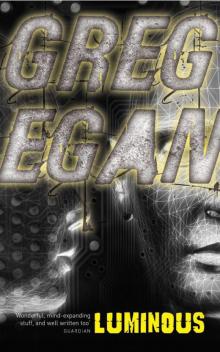 Luminous
Luminous